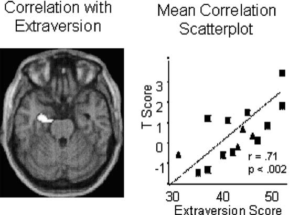Written by Muriel Leuenberger

The ancient Greek injunction “Know Thyself” inscribed at the temple of Delphi represents just one among many instances where we are encouraged to pursue self-knowledge. Socrates argued that “examining myself and others is the greatest good” and according to Kant moral self-cognition is ‘‘the First Command of all Duties to Oneself’’. Moreover, the pursuit of self-knowledge and how it helps us to become wiser, better, and happier is such a common theme in popular culture that you can find numerous lists online of the 10, 15, or 39 best movies and books on self-knowledge.
The pursuit of self-knowledge is traditionally understood as a matter of introspection, of looking inward. But in the last decades, it is external devices that have promised us insight into who we are, from phones to watches to health trackers. These are technologies that can gather a vast amount or new kinds of personal information (“PI technologies” for short). PI technology can provide autobiographical information through text messages, pictures, location trackers, call logs, email and browser histories, and more. Technologies that allow us to capture and store even the most mundane past experiences and social interactions have become much more powerful and accessible (particularly in industrialized nations) in the past decades. PI technology furthermore allows us to gather a vast amount of information about our health and activity through fitness trackers, step counters, or apps like DrinkLess to reduce alcohol consumption and MySugr to measure glucose levels for diabetics. A further category of a comparatively novel kind of technological personal information is neuroinformation. Information about the brain stands out in comparison to other bioinformation because aspects deemed central for identity, such as personality, memory, and mental capacities depend on it. Neuroinformation, commonly gathered through neuroimaging, can reveal not only mental health but social attitudes, personality, humor, memories, or impulse control [1]. In one of the most advanced forms of mind-reading researchers were able to decode the semantic content of a movie a person was watching by measuring brain activity [2]. Lastly, I want to mention the far-reaching inferences that can be drawn from online behavior. Spoken languages, age, political opinions, income bracket, specific present and likely future preferences in food, clothes, or entertainment, and even whether one is likely to have insomnia or depression can be inferred from social media posts, Facebook likes, web search queries, location trackers, purchase records, playlists, how we interact with a homepage, and other traces we leave online [3].
If we believe that self-knowledge is a good, and PI technology promises us more of it, is there a duty to use this technology, or use it in the right way? Should “track thyself” be our new mantra? Of course, this depends on whether PI technologies can provide us with information about ourselves that is truly relevant for the kind of self-knowledge we should have. Knowing the number of hairs on your head will not make you into a better, wiser, or happier person, nor will knowing exactly how many times you have listened to Despacito. But some information provided by PI technology still might.

PI technology may in some cases deliver personal information that can increase prudentially valuable self-knowledge as well as self-knowledge that benefits others. A person reading past text messages may come to realize that he comes off as aloof and distanced. This insight could help him to act differently and to establish closer relationships with the people he cares about. Information about one’s physical and mental health provided by health trackers, neuroimaging, or even digital profiling can help to manage limitations and disorders and to develop one’s strengths in a prudentially and socially beneficial way.
The recent philosophical debate has seen an increased interest in duties to oneself. Might we also be obligated to ourselves to know ourselves? One reason why we might think we have a duty to ourselves to pursue self-knowledge is that intimate relationships of love and respect require that we know the other person. Because we cannot avoid being in an intimate relationship with ourselves, self-love and self-respect require that we know ourselves [4]. Loving and respecting yourself requires having substantial self-knowledge which entails facts about your character, values, abilities, aptitudes, emotions, beliefs, and what makes you happy [5].
This kind of substantial self-knowledge can be hard to come by through PI technology, but it can nonetheless be a helpful tool. Some technologies can make direct claims about substantial characteristics. For instance, neuroimaging might identify a personality trait. However, so far, most of the direct characterizations by PI technology are rather crude. A neuroimaging study showing whether you are extroverted will likely not reveal anything substantially new to you. In most cases, current technology would not provide information in the form of a direct claim about substantial characteristics that go beyond what regular levels of self-awareness wouldn’t already grant. PI technology can, however, provide data that can serve as evidence from which we infer substantial self-knowledge. Autobiographical information stored in text messages, pictures, browser history, etc. can help someone to gain insights into how they behave with others, what they care about, and into their character, emotions, and beliefs. The preferences and other characteristics companies infer from online behavior can also cue self-reflection and personal insights. Why does Google think I like hiking? Do I like hiking? What made Spotify think I want to listen to this album?

PI technologies can be a helpful tool to gain self-knowledge but, in many cases, they are likely not the best means to achieve self-knowledge. An honest conversation with a friend is often more helpful than the newest insights neuroimaging can give us. Moreover, PI technologies have some shortcomings regarding their ability to help us gain self-knowledge. They can be and often are inaccurate. You can look up what Google thinks it knows about you. Depending on your browsing habits this can be scarily accurate, but it still tends to get some things wrong. PI technology is also highly intransparent. How the information has been gathered, how the collected personal data is processed and connected to categories of preferences, personality, beliefs, disorders, etc., and how those categories are defined is often inaccessible or very complicated to understand, notably in the case of neuroimaging or digital profiling.
Self-knowledge is not just about collecting facts about yourself but requires interpretation, assessment, and concepts of categorization. To discover helpful behavior in your text messages and characterize yourself as a helpful person you have to understand what it means to be helpful and why being helpful is a meaningful characteristic. Those characterizing concepts are created, shaped, and disputed in a social and political environment. PI technology is part of this environment and shapes and defines such characterizing categories. It can, for instance, influence what we deem significant about ourselves. A few decades ago, hardly anyone used to know their daily step count. Now, for many people, it is at least temporarily an important project to achieve a certain number of steps a day. The widespread use of a handful of technologies gives some companies an exceptionally powerful voice in this debate on how we should define ourselves. Because such characterizing concepts can be damaging or oppressive, we should consider carefully who gets to shape them.
So, should we track and measure ourselves on the grounds of the ethics of self-knowledge? In some cases, PI technology can provide valuable information that can lead to self-knowledge relevant for prudential interests, other-directed concerns, and duties to oneself. However, it also provides a host of information that is inaccurate, insignificant, and intransparent – junk information. If we are concerned with self-knowledge, instead of counting daily steps or learning whether you are in the top 2% of Childish Gambino listeners, we might do better to first pay attention to who defines relevant categories of self-characterization as well as how and in whose interest this occurs.
- Canli, T. and Z. Amin, Neuroimaging of Emotion and Personality: Scientific Evidence and Ethical Considerations. Brain and Cognition, 2002. 50(3): p. 414-431.
- Huth, A.G., et al., Decoding the Semantic Content of Natural Movies from Human Brain Activity. Frontiers in Systems Neuroscience, 2016. 10(81).
- Loi, M., The Digital Phenotype: A Philosophical and Ethical Exploration. Philosophy & Technology, 2019. 32(1): p. 155-171.
- Mackenzie, J., Knowing Yourself and Being Worth Knowing. Journal of the American Philosophical Association, 2018. 4(2): p. 243-261.
- Cassam, Q., Self-knowledge for humans. 2014: Oxford University Press, USA.

A good friend applies a form of personal information technology to everyday activities and arenas. He keeps a journal. He is not a journalist, though he also writes good, introspective and retrospective poetry. I have a hit-and-miss system that I apply to my own writing. It is strangely effective, in an unorganized way. Often, after writing thoughts down, I am unsatisfied with content, context or direction. No, I don’t wad it up and throw it in a waste basket, nor do I delete a draft that has been hammered out on my tablet…I save the rejected text. It is good that this is an MO. A cooling off often takes me back to the topic, allowing another crack at what I wanted it to convey. Patience is key to the success of this method. I have enough of that
A carefully balanced argument, the thrust of which would have many rushing off to feed, or correct, the systems whilst raising questions in the minds of many others.
To elaborate; as the article identifies, the impact upon the individual of social groups, unknown and unsupported by the individual, are continuing to increase and become more refined over time as a result of technological improvements and the widespread uncontrolled/inconsiderate collection, sale, and use of personal information. But the very carefully maintained focus and sustained balance of arguments within this article, especially if quickly read, tend towards masking a basic issue by reducing the importance of the refinements/advancements in technological answers in favour of the advancement of the individual whilst at the same time providing the opportunity of obtaining more accurate information and location (I.P. or geolocation) from those checking themselves, unless they use an anonymising proxy service (e.g. TOR). That strict focus of the article, in itself, is possibly communicating what is probably a denial regarding the importance of intelligence generally (often created by transparency) in favour of individual intelligence, an all too frequently seen issue in many social groups and a difficulty to be overcome in high level writing. Note to self for the future, to ethically reflect upon that; Which ethical reference was used in making that basic observation, psychology or the arts? And which would be most contextually appropriate?
Yes, one of the main defences against industrial/social scale intrusions into individual life is the freedom of (fully aware) private self-reflection, informed but uninfluenced by the creation of impressions/influences from external intrusions potentially driven by information many individuals themselves may not be completely aware of, are in the process of learning, or have just learned (and so now begin to recognize). And to each individual a suitable method to achieve the protections allowing that space for free self-reflection is a determination coming from such reflection; rather than, as the article points out, merely building upon an existing categorization within a set previously designed to provide particular outcomes.
A presentation of the same message? Possibly, but informed from another perspective reflecting another worldview containing additional material.
Comments are closed.